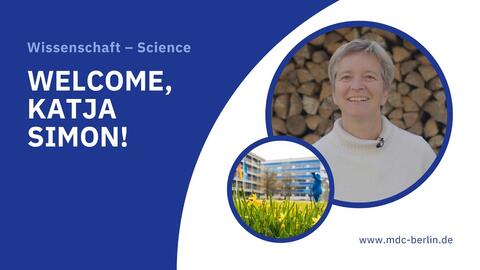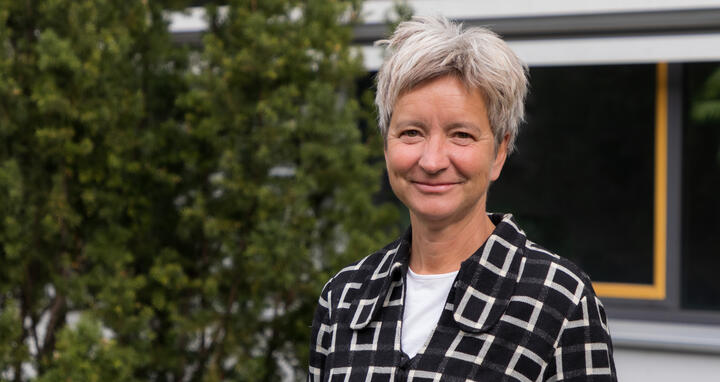Katja Simon seeks to rejuvenate the body’s immune defenses

Cells are sustainability specialists. They eat all the organelles and larger molecular complexes that are no longer needed – in order to then reuse the waste products to build new structures. The name given to this cellular recycling process is “autophagy.” It is used by yeasts as well as by all plant, animal, and human cells. According to Katja Simon, “Without autophagy, cells could not develop or function normally. They would also age faster without it.” Professor Simon has just left one of the most renowned universities in the world, the University of Oxford in the UK, to join the Max Delbrück Center for Molecular Medicine in the Helmholtz Association in Berlin (MDC).
Without autophagy, cells could not develop or function normally. They would also age faster without it.
The 55-year-old immunologist joined the MDC as part of the “Helmholtz Distinguished Professorship” initiative, an effort to attract outstanding female scientists from abroad. She is starting a new lab that will be affiliated with the division of “Integrative Biomedicine.” Simon is currently putting together a team of about ten researchers, with which she will continue the research on autophagy in the immune system that she began at Oxford. Her new position carries with it a joint appointment as a W3-S professor for the “Cell Biology of Immunity” at Charité – Universitätsmedizin Berlin. Four of the ten new positions at the MDC will be funded by an “Investigator Award” that Simon recently received from the Wellcome Trust, a charitable foundation based in London.
The perfect time to return to Berlin
This post signals a return to Simon’s academic roots. After growing up in Hamburg and Paris, she completed her university studies in Berlin: first at the Free University and then at the German Rheumatism Research Center (DRFZ Berlin), where she was the institute’s first female PhD candidate. Simon then held postdoc positions in Marseille and Oxford, where she and her husband, British immunologist Professor Quentin Sattentau, raised three children. Their youngest daughter has now finished high school. “And so it was the perfect time for me to return to Germany,” Simon says. Her husband will join her at MDC with guest status.
Simon’s research career has not always followed a straight line. Which explains her commitment to mentoring and supporting young female scientists. Her own mother was a photographer and her father a writer and journalist. At the moment, however, she is primarily focused on setting up her lab. That doesn’t leave her with much time to get reacquainted with her old home city of Berlin. “Nevertheless,” she remarks, “I’m excited to dive into Berlin’s cultural life, go swimming in the city’s many lakes, and go jogging and cycling along their banks.”
Without autophagy, cells age much faster
She is also keen to meet her many new colleagues and to begin working on joint projects with them. “I’m very excited by the prospect of using the proteomics and transcriptomics facilities.” For there are still many unanswered questions about the role of autophagy in the body’s immune defenses. “For example,” Simon says, “I would like to discover more details about how long-term immune cells – such as memory T and B cells, whose benefits include ensuring that vaccinations provide protection for many years – barely age thanks to autophagy.” Simon succeeded in showing that this is indeed a property of cells in her early research with mice. The animals aged much faster when their genes for autophagy were turned off.
In 2010, we were the first to shut down autophagy in hematopoietic stem cells. The result, which initially we could not explain, was that the mice’s blood turned yellow.
There is one experiment that Simon recalls with particular enthusiasm. “In 2010,” she explains, “we were the first to shut down autophagy in hematopoietic stem cells. The result, which initially we could not explain, was that the mice’s blood turned yellow.” As it turned out, the mice were suffering from severe anemia because the red blood cells could no longer break down their organelles. In consequence, the cells lost their special form and their function.
New strength for a weakened immune system
At MDC, Simon would now like to search for substances that stimulate autophagy in immune cells. According to her hypothesis, this may be a way to rejuvenate the body’s immune defenses, which get weaker with age. “It is my firm intention to apply the results of my research on cells and animals to human medicine,” Simon says. She has already begun an initial clinical trial with 40 participants in the United Kingdom. Its aim is to explore whether the substance spermidine, which activates autophagy in cells and demonstrably prolongs lifespan in mice, can help the immune system to create better memory cells – and thus lengthen the protection afforded by Covid-19 vaccines.
Text: Anke Brodmerkel





